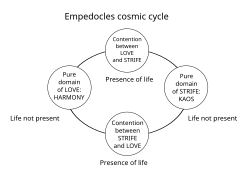Empedocles
Empedocles [3] was a Greek pre-Socratic philosopher who lived in Agrigentum, a Greek colony in Sicily.
Empedocles | |
|---|---|
 Empedocles, 17th-century engraving | |
| Born | c. 490 BC |
| Died | c. 430 BC (aged around 60) Mount Etna, Sicily |
| Era | Pre-Socratic philosophy |
| Region | Western philosophy |
| School | Pluralist school |
Main interests | Cosmogenesis, ontology, epistemology |
Notable ideas | All matter is made up of four elements: water, earth, air and fire The cosmic principles of Philotes ("Love") and Neikos ("Repulsion")[1] Theories about respiration[2] |
Influences
| |
Influenced
| |
Empedocles' philosophy is best known for being the origin of the cosmogenic theory of the four classical elements in the Western world. He also proposed powers called Love and Strife which would act as forces to bring about the mixture and separation of the elements.
Influenced by the Pythagoreans, he supported the doctrine of reincarnation. Empedocles was perhaps the last Greek philosopher to record his ideas in verse. Some of his work still survives today, more so than in the case of any other Presocratic philosopher. Empedocles' death was mythologized by ancient writers, and has been the subject of a number of literary treatments.
Empedocles Media
Empedocles' theory four elements (fire, air, water and earth), woodcut from a 1472 edition of Lucretius' De rerum natura
The Strasbourg Empedocles papyrus contained over 50 lines from Empedocles' work On Nature that were not published until 1999.[4]
The Death of Empedocles by Salvator Rosa (1615–1673), depicting the legendary alleged suicide of Empedocles jumping into Mount Etna in Sicily
The first lines of "On Nature" from a 1908 copy of "The fragments of Empedocles," translated by William Ellery Leonard
References
- ↑ Frank Reynolds, David Tracy (eds.), Myth and Philosophy, SUNY Press, 1990, p. 99.
- ↑ Frag. B100 (Aristotle, On Respiration, 473b1–474a6)
- ↑ Greek: Ἐμπεδοκλῆς, ca. 490–430 BC
- ↑ Martin & Primavesi 1999.
+{{{1}}}−{{{2}}}





